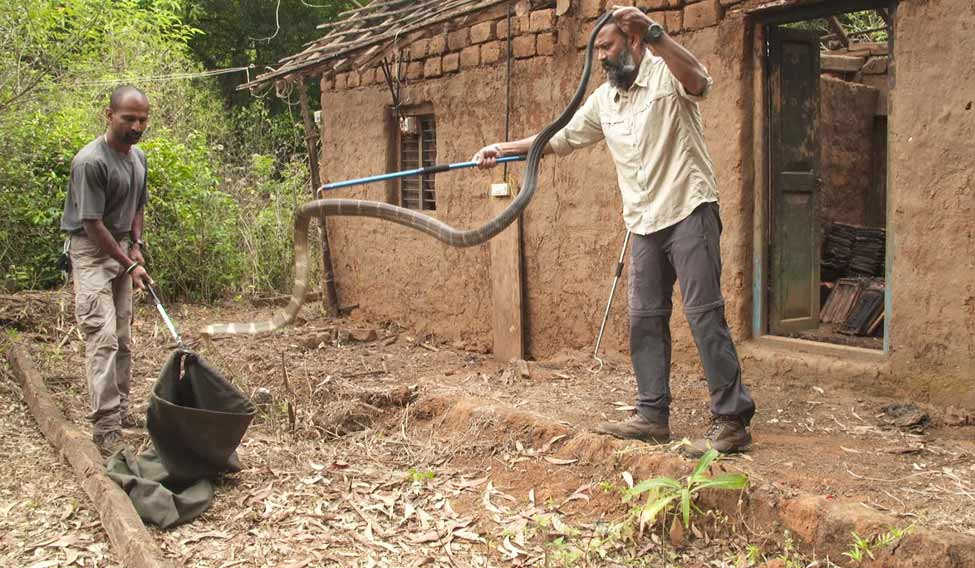We live in a time where animals in the wild and humans find it difficult to coexist. Despite this, P. Gowri Shankar, a herpetologist, has managed to develop a system where people from the villages around the rich terrains of the Western Ghats coexist with the world’s longest venomous snake—the King cobra.
Having worked with snakes from the age of 13, it was only natural for Gowri Shankar to dedicate his life towards studying them. He started his career at the Madras Crocodile Bank under the guidance of Romulus Whitaker, conservationist and founder of the Madras Snake Park. Today, Gowri Shankar is among the few people in the world striving to study and understand king cobras in their natural habitat. Apart from publishing several scientific papers on king cobras, he has also rescued over 300 snakes in distress situations and monitored 30 nests and released more than 500 hatchlings. He has been instrumental in initiating the pioneering radio telemetry study on King cobras. From more than 10 years of solid research, we have learnt that these snakes can climb trees, swim, use canopies to hide and even eat monitor lizards. His passion and interest towards the ecology and conservation of the species is exceptional. Having volunteered at Crocodile Bank throughout my childhood, I grew up watching Gowri Shankar. He has been an inspiration and one of the reasons behind my interest in learning to rescue and rehabilitate reptiles.
Gowri Shankar started the Kalinga Foundation in Agumbe, a conservation NGO and Kalinga Centre for Rainforest Ecology(KCRE), an environmental education camp site in 2012. The Kalinga foundation acts as a platform for research and education. It is a beautiful facility located in the dense rainforest region of Agumbe, a small village in the Shimoga district of Karnataka. Also called the Cherrapunji of South India, it receives massive amounts of rainfall every year. The organisation’s mission is to help people experience the rich ecosystem in a responsible and ethical manner. It is a got-to pace for wildlife filmmakers, photographers, herpetologists, students and nature enthusiasts.
I visited KCRE during April during the King cobra’s annual breeding season. The entire mating ritual is fascinating and is a unique phenomenon that is seen only among King Cobras. Having visited KCRE since its inception, I can vouch for the tranquility and beauty of the place. The fully equipped camp site is truly a unique experience for anyone who wants to get a taste of life in a rainforest. It is also probably the only research centre that focuses largely on unique workshops and programmes to educate people about snakes. Scientific Training on Reptile Management (STORM) is one such workshop that introduces people to the life of reptiles, handling, rescuing and relocation of snakes in a humane manner.
The 'Snakes in our neighbourhood' programme teaches members of residential communities, townships, factories and colleges to become more aware of their surroundings and to coexist with wildlife especially snakes and other reptiles. The local people from the villages in and around the research station have deep-rooted respect for these snakes and even worship them. Using this cultural component to his advantage, Gowri Shankar has managed to educate and help them understand the importance of conservation. These snakes are integral to the ecosystem; they are highly intelligent, they eat other snakes (including venomous snakes) and hence a natural control system for villagers.
By using educational films and workshops, people of all ages are taught to have a positive impact on their surroundings. Local students are involved in the annual nesting process of these snakes and are even provided with incentives to encourage them. It is not every day you can see an entire community, spreading over 80 kilometers, casually coexisting with the world’s longest venomous snake.The support system is so well ingrained in the community that people call Gowri Shankar and his team for absolutely anything related to cobras. These sightings and calls have been crucial for research.
Gowri Shankar feels that there is still very limited knowledge in understanding the complete behaviour of this special snake. He believes education is the cornerstone of conservation, and resynchronising with nature is the way forward. Through KCRE and his work, he hopes in building an eco-conscious tribe.
PEOPLE
A life with the King
 P. Gowri Shankar (R) spends his time studying the behaviour of King cobras in the rainforests of Agumbe in Karnataka
P. Gowri Shankar (R) spends his time studying the behaviour of King cobras in the rainforests of Agumbe in Karnataka
This browser settings will not support to add bookmarks programmatically. Please press Ctrl+D or change settings to bookmark this page.
THE WEEK
Select your subscription
Please select subscription.
Select payment method
Please select payment method.
Confirm your subscription
Recharge E-Wallet
Enter recharge amount:
Topics :
#Society
| #environment






